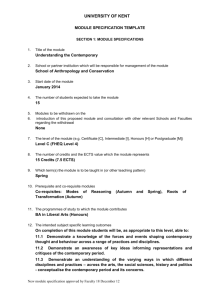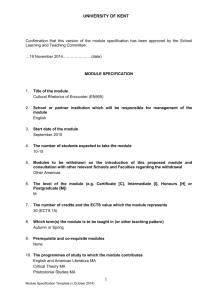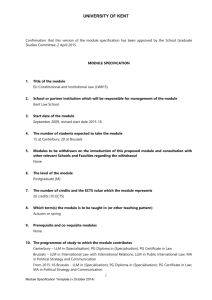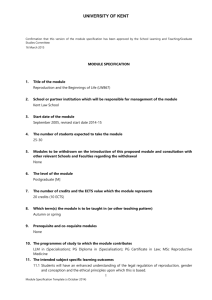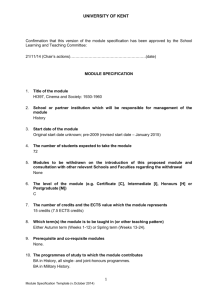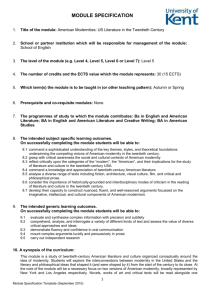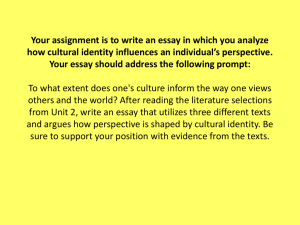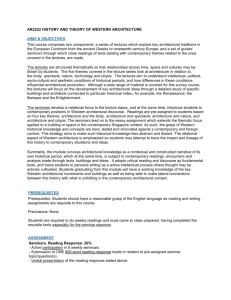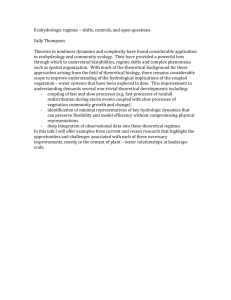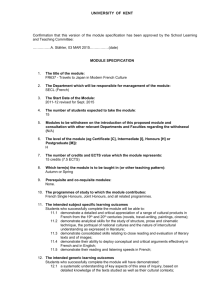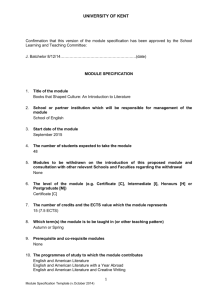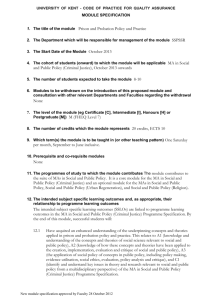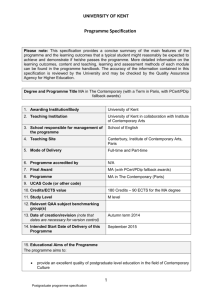Critical Legal Theory (LW507)
advertisement
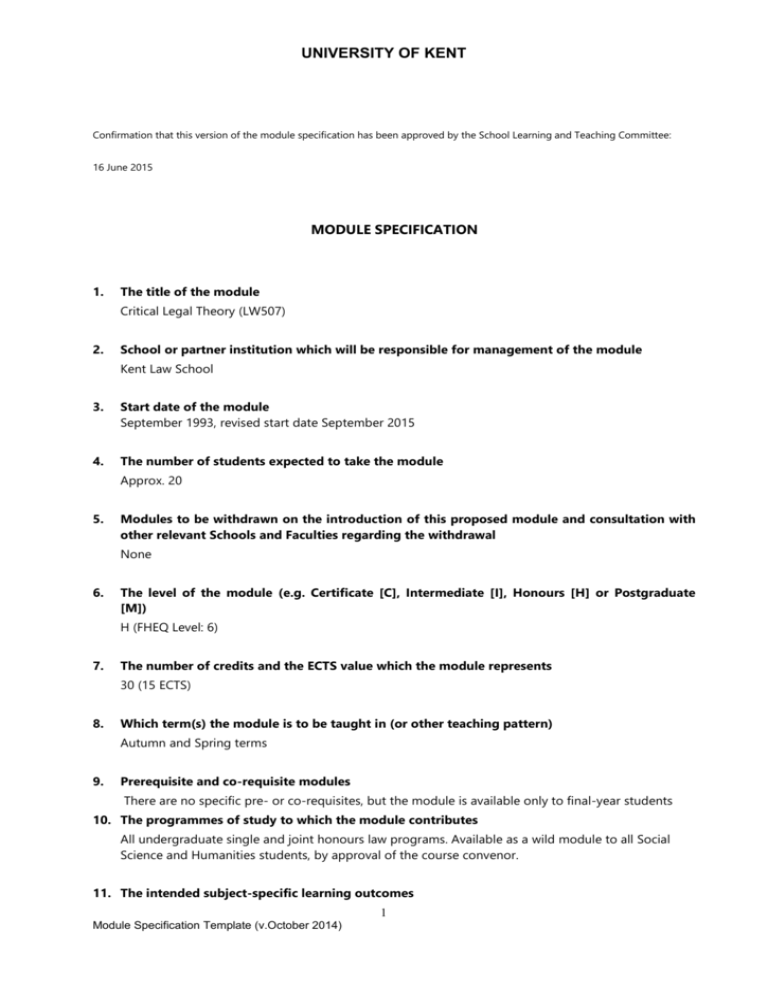
UNIVERSITY OF KENT Confirmation that this version of the module specification has been approved by the School Learning and Teaching Committee: 16 June 2015 MODULE SPECIFICATION 1. The title of the module Critical Legal Theory (LW507) 2. School or partner institution which will be responsible for management of the module Kent Law School 3. Start date of the module September 1993, revised start date September 2015 4. The number of students expected to take the module Approx. 20 5. Modules to be withdrawn on the introduction of this proposed module and consultation with other relevant Schools and Faculties regarding the withdrawal None 6. The level of the module (e.g. Certificate [C], Intermediate [I], Honours [H] or Postgraduate [M]) H (FHEQ Level: 6) 7. The number of credits and the ECTS value which the module represents 30 (15 ECTS) 8. Which term(s) the module is to be taught in (or other teaching pattern) Autumn and Spring terms 9. Prerequisite and co-requisite modules There are no specific pre- or co-requisites, but the module is available only to final-year students 10. The programmes of study to which the module contributes All undergraduate single and joint honours law programs. Available as a wild module to all Social Science and Humanities students, by approval of the course convenor. 11. The intended subject-specific learning outcomes 1 Module Specification Template (v.October 2014) UNIVERSITY OF KENT 11.1 Understand the special value of theoretical inquiry to critical approaches to law 11.2 Be able to demonstrate familiarity with the central concepts, motivations, principles, traditions and debates of contemporary critical legal theory 11.3 Interrogate the relationship between normative and critical legal theories 11.4 Be able to critically analyse legal concepts, practices, techniques, phenomena and events 11.5 Be able to critically reflect on the nature of law in modernity, modern law’s particular configuration of the relationship between law and life, and the way modern law shapes contemporary legal, political and cultural relations 11.6 Understand the political and ethical relationship between critique and justice, and the distinctive role of critical legal theory in relation to law, legal practices, and contemporary political and legal problems 11.7 Demonstrate the ability to critically reflect on the separation of law from other academic disciplines, practices and concepts 11.8 Appreciate the importance to the contemporary critique of law of perspectives developed in other disciplines, such as political theory, aesthetic theory, visual culture, rhetoric, film studies, critical philosophy, theology, political theology, literature and literary studies, linguistics, historical studies, psychoanalysis, sociology and economics 11.9 Critically reflect on the relationship between theory and practice in a legal context 12. The intended generic learning outcomes 12.1 Close reading of texts, including sophisticated theoretical material 12.2 Critical analysis of texts, including legal texts, and of legal and juridical problems as they arise in texts from multiple disciplines 12.3 Conceptual synthesis of a variety of sources, textual and non-textual, from multiple disciplines 12.4 The ability to make reflective comments in group discussion, and to lead group discussions 12.5 The ability to engage in collaborative discussion with others to develop and refine understandings of complex material 12.6 The development of a reflective, self-directed and independent approach to learning 12.7 The ability to make a coherent and sustained written argument 12.8 The formulation of critical legal research questions within a theoretical field, or drawing substantially on a theoretical field 12.9 The development of oral and written communication skills. 13. A synopsis of the curriculum This module is intended to introduce students to the major debates, questions, concepts and theoretical approaches in the critique of law. It offers a grounding in several key aspects of legal theory, and some major ways of characterising law in Modernity. Students completing this module will develop a greater precision, articulacy and rigour in all of their considerations of law. The module is also intended as training in the making of well-considered and supported critical arguments. After an introduction addressing the nature and practice of legal critique, the module has two main parts. In the first part, students will be introduced to key topics in critical legal theory, such as sovereignty and the legal subject, jurisdiction, legal interpretation, judgment, and justice. These topics will be considered with an eye to the overarching question of the relation between law and political authority. In the second part of the course, this conceptual vocabulary will be applied to a range of contemporary issues. Examples might include issues in biotechnology, facebook and social media, political protest, films and other popular cultural forms, social equality, terrorism and counter2 Module Specification Template (v.October 2014) UNIVERSITY OF KENT terrorism, torture, the casualized workforce, and the plight of the refugee; and any other issues as relevant from time to time. In addition to the critical legal perspectives developed in the first part of the course, the module will draw on appropriate specialist theoretical material from other disciplines relevant to the contemporary issues selected for analysis. 14. Indicative Reading List Constable, M., 2005. Just Silences: The Limits and Possibilities of Modern Law. Princeton: Princeton University Press. Dorsett, S. & McVeigh, S., 2012. Jurisdiction. Abingdon: Routledge. Douzinas, C. & Geary, A. 2005. Critical Jurisprudence: The Political Philosophy of Justice. Oxford: Hart. Esposito, R., 2012. Third Person: The Politics of Life and Philosophy of the Impersonal. Cambridge: Polity. Foucault, M., 2007. The Politics of Truth. Los Angeles: Semiotext(e). Goodrich, P., 1990. The Languages of Law. London: Weidenfeld. Leiboff, M and Thomas, M, 2004 .Legal Theories: In Principle. Sydney: Thompson. Leiboff, M. and Thomas, M., 2014 (2nd ed). Legal Theories: Contexts and Practices. Sydney: Thompson. Latour, B. 2010. The Making of Law. Cambridge: Polity. Murphy, T., 1997. The Oldest Social Science? Configurations of Law and Modernity. Oxford: Oxford University Press. Pottage, A. and Mundy, M. 2004. Law, Anthropology and the Constitution of the Social. Cambridge: Cambridge University Press. Riles, A. 2001. Collateral Knowledge: Legal Reasoning in the Global Financial Markets. Chicago: Chicago University Press. 15. Learning and Teaching Methods, including the nature and number of contact hours and the total study hours which will be expected of students, and how these relate to achievement of the intended learning outcomes The module will be allocated 300 hours, and will be taught in a series of 20 x 2hr seminars across the autumn and spring terms (40 hours). The remaining 260 hours will be allocated to private study, comprising preparation for seminars, researching, and writing). Seminars will provide a structured introduction to the topic and the set material for the week, in order to orient students to the interpretation of primary sources and the questions they raise for module learning. Students will participate in guided whole-group discussion, student-led discussions and unguided small-group discussion on specifically determined questions. Seminars may also include in-class reading or writing exercises, screenings and audio material as appropriate. Some seminar time will be allocated to providing guidance concerning assessment expectations, particularly instruction and advice on the process of researching, developing and writing a critical theoretical argument. Students will be provided with a detailed module outline that sets out a short introduction to each topic. It will also list the required reading for each seminar, seminar questions to guide that reading, and a list of further reading. Further readings will enable students either to obtain a more solid grounding in basic concepts used in the class, or a more developed understanding of materials in question (for example if they wish to pursue research in the area for their assessment). Seminars meet module learning outcomes 11.1 – 9 and 12.1 – 9. Private study contributes to module learning outcomes 11.1 – 6 ,8 & 9 and 12.1 –3 & 5 - 9, in particular 12. 7. 3 Module Specification Template (v.October 2014) UNIVERSITY OF KENT 16. Assessment methods and how these relate to testing achievement of the intended learning outcomes 1. 2. 3. Class participation (10%), students will be assessed on their contribution to and participation in class discussion and debate. The class participation requirement tests 11.1 – 9 by focusing students to understand and invest in the debates, analyses and discussions in the class. It is particularly important in assessing outcomes 12.4-12.5, and 12.9. A 1500-word essay (10%). The essay will support MLO’s 12.1 -3, 12.6 – 12.9 and will test the achievement of 11.1 – 9. Research essay, 6,000- 7,000 words (80%). Primarily addressed at achieving 12.7, the research essay also assesses achievement of generic outcomes 12.1-12.3, 12.6, and 12.8-12.9. Depending on the topic chosen the essay will also test the achievement of many of the subject specific outcomes and students will be directed towards work that furthers as broad a range of MLO’s 11.1 – 9 as possible. 17. Implications for learning resources, including staff, library, IT and space Most of the expected teaching material is available in the Templeman collection, through electronic download, or is in the private collection of the module convenor. A small number of new texts may need to be ordered. The module will be delivered by current member of staff. 18. The School recognises and has embedded the expectations of current disability equality legislation, and supports students with a declared disability or special educational need in its teaching. Within this module we will make reasonable adjustments wherever necessary, including additional or substitute materials, teaching modes or assessment methods for students who have declared and discussed their learning support needs. Arrangements for students with declared disabilities will be made on an individual basis, in consultation with the University’s disability/dyslexia support service, and specialist support will be provided where needed. 19. Campus where module will be delivered Canterbury 4 Module Specification Template (v.October 2014)
